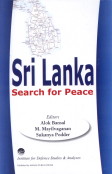Ilankai Tamil Sangam28th Year on the Web Association of Tamils of Sri Lanka in the USA |
|||
 Home Home Archives Archives |
"Sri Lanka: Search for Peace"
International community must expand role in Sri Lanka, says book New Delhi, Nov 16 (IANS) The international community is the best bet to bring peace to Sri Lanka but it needs to sharply expand its role by becoming the mediator between the Tamil Tigers and Colombo, an Indian scholar says in a new book. P. Sahadevan of Jawaharlal Nehru University (JNU) here, however, contends that the global actors have failed to understand the Liberation Tigers of Tamil Eelam (LTTE), one of the most fanatic insurgent groups in the world. Sahadevan's comments form a key part of 'Sri Lanka: Search for Peace,' a collection of essays by experts the New Delhi-based Institute of Defence Studies and Analyses (IDSA) has just brought out. The US, the European Union, Japan and peace facilitator Norway, which brokered a ceasefire agreement between the LTTE and the government in February 2002, oversee Sri Lanka's now tattered peace process in consultation with India. Sahadevan said the international community 'must take appropriate steps to increase the peace making capacity of both the protagonists while creating severe constraints on their war-making capabilities. 'Since its limited facilitation role, especially by the Norwegians, has proved to be a total failure, it is essential that the international community significantly expands its role and becomes pro-active by mediating between the parties. 'Such an involvement may evoke an internal political resistance which the mainstream democratic forces should be in a position to manage. This requires a bipartisan political approach - the much needed southern consensus on peace making.' But Sahadevan raised questions about other countries' understanding of the LTTE.
Sahadevan described as 'a political mistake' the European Union's decision to ban the LTTE last year.
According to him, once an external actor takes upon itself the task of making peace between the combatants, 'it should be in a position to treat both of them as principal partners of sustainable peace at least in political, if not legal, terms... He said that one of the main reasons why the leverage of powerful countries over the LTTE was not working was the 'unequal application of international pressure, meaning that the LTTE is coerced while the Sri Lankan government is spared.
Despite many shortcomings, Sahadevan argued that the international community's role was significant and critical to resolve Sri Lanka's ethnic conflict that has raged since 1983 and shows no signs of ending. ------------------------------------------------------------------------------------------------ Contents: Foreword. Introduction. I. Analysing the conflict and the peace process: 1. Situating the conflict in the right perspective/B. Raman. 2. Negotiating with the non-negotiable/Sumansiri Liyanage. 3. Negotiating with the LTTE: an Indian perspective/V. Suryanarayan. 4. Muslims and the peace process/Mirak Raheem. II. Peace Process in Sri Lanka: the external dimensions: 5. The peace process: role of the international community/P. Sahadevan. 6. Indo-Sri Lankan relations: back to the drawing boards/Sushil Sirivardene and Jayadeva Uyangoda. 7. Sri Lanka's plight: an Indian view/A. Madhavan. 8. Conflict in Sri Lanka: the role India can play/P.J. Jacob. 9. Need for a review of Indian policy on the Sri Lankan Conflict/R.M.B. Senanayake. III. Alternative/possible solutions: 10. Debating a new holistic approach to peace in Sri Lanka/P.P. Devaraj. 11. New thinking on power devolution/Shivaji Felix. 12. Power sharing: the only way out/Jayampathy Wickremaratne. 13. Critical aspects on democracy, terrorism and human rights for a negotiated political settlement/Desmond Fernando. 14. Postscript crisis in Sri Lanka: an Indian perspective/Ashok K. Behuria and M. Mayilvagnan. Index.
| ||
 Sri Lanka: Search for Peace/edited by Alok Bansal, M. Mayilvaganan and Sukanya Podder. New Delhi, Manas Pub., 2007, 248 p., $33. ISBN 81-7049-340-4.
Sri Lanka: Search for Peace/edited by Alok Bansal, M. Mayilvaganan and Sukanya Podder. New Delhi, Manas Pub., 2007, 248 p., $33. ISBN 81-7049-340-4.